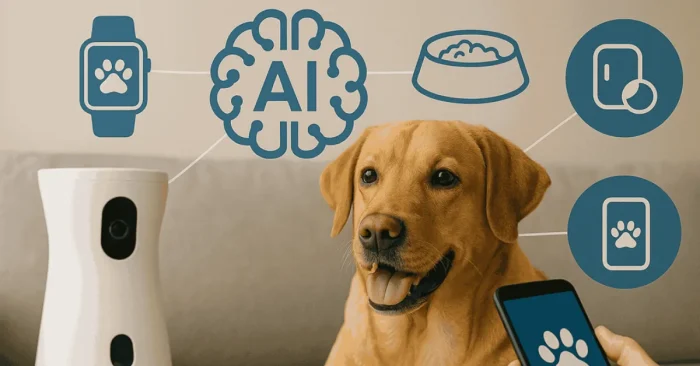Overview
AI tools for pet care are reshaping how owners monitor, train, and look after their pets. These tools use machine learning, smart sensors, and mobile apps to track health, detect unusual behaviors, and recommend proper diets. AI helps in scheduling vet visits, suggesting exercise routines, and providing real-time updates on a pet’s well-being. From automatic feeders to AI-powered cameras, these innovations make pet ownership easier and more efficient. They not only ensure pets stay healthy and happy but also give peace of mind to owners by offering continuous support and guidance in daily care routines.
1. AI in Pet Health Monitoring
AI-powered devices monitor a pet’s health by tracking heart rate, sleep cycles, and activity levels. These tools analyze the collected data to detect early symptoms of illness or discomfort. For example, a sudden drop in activity could indicate fatigue, stress, or potential health issues. Many apps send real-time alerts to pet owners, allowing them to take quick action. By integrating with veterinary systems, AI also helps doctors understand a pet’s lifestyle and medical history better. This continuous monitoring ensures pets receive preventive care and timely treatment, leading to healthier and longer lives.
2. AI for Smart Feeding
AI-enabled feeders automate meal times and control portion sizes based on the pet’s age, weight, and dietary needs. These systems track how much food a pet consumes and adjust portions to prevent overeating or underfeeding. Some smart feeders can even identify the pet using facial recognition and dispense food accordingly, ensuring fairness in multi-pet households. AI also provides nutritional recommendations, suggesting diets that improve overall health and energy. By analyzing eating patterns, it can detect appetite changes that may indicate health problems. This smart feeding approach promotes balanced nutrition and supports long-term well-being.
3. AI in Pet Behavior Analysis
AI tools use cameras and sensors to study pet behavior, detecting stress, anxiety, or unusual activities. For instance, constant barking or scratching might indicate emotional distress or discomfort. These tools provide insights into behavior patterns, helping owners identify triggers and improve pet training. Some AI apps suggest playtime routines, calming techniques, or new toys to reduce stress. Additionally, AI-powered collars and trackers monitor outdoor movements, ensuring pets stay safe. With this technology, owners can better understand their pets’ emotions, improve bonding, and create a healthier living environment that supports both mental and physical well-being.
4. AI for Pet Training
AI-based training apps and devices help pet owners teach commands, improve obedience, and correct unwanted behaviors. These tools use positive reinforcement methods, such as sound cues or reward systems, to guide pets during training sessions. Advanced AI apps customize training plans based on a pet’s breed, age, and temperament, ensuring more effective results. Some systems also track progress and adapt exercises as the pet improves. For busy owners, AI-powered interactive toys can keep pets engaged and mentally stimulated throughout the day. This makes training easier, faster, and more enjoyable, creating well-behaved and happier pets.
5. AI in Veterinary Support
AI assists veterinarians by analyzing medical records, lab results, and lifestyle data to provide accurate diagnoses and treatment plans. Some platforms use predictive analytics to anticipate potential health risks, enabling preventive care. AI also supports telemedicine, allowing owners to consult with vets remotely and share real-time health data from smart devices. This reduces unnecessary visits and ensures timely interventions. For chronic conditions like diabetes or arthritis, AI can track symptoms and recommend lifestyle changes. By combining technology with professional expertise, AI enhances veterinary care, improves efficiency, and ensures pets receive the best possible treatment at the right time.
6. AI in Pet Safety and Tracking
AI-powered GPS trackers and smart collars keep pets safe by monitoring their location and movements. These tools send instant alerts if a pet leaves a designated safe zone, helping prevent loss or accidents. Some advanced trackers even analyze walking patterns to identify injuries or health concerns. AI integrates with smartphones, allowing owners to check location and activity history anytime. In case of emergencies, these tools provide quick directions to locate pets. This real-time monitoring not only gives peace of mind to pet owners but also ensures that pets remain safe, active, and well-protected in all environments.
7. AI for Personalized Diet Plans
AI analyzes a pet’s age, breed, weight, and medical history to recommend personalized diet plans. By tracking daily meals and nutritional intake, AI ensures that pets receive balanced diets tailored to their unique needs. Some apps suggest food alternatives, highlight deficiencies, and even recommend supplements for better health. AI also identifies ingredients that may cause allergies and helps owners avoid harmful foods. With continuous monitoring, these tools adjust diets as pets grow or face new health challenges. Personalized nutrition improves immunity, supports growth, and promotes overall wellness, making AI an essential tool for pet dietary management.
8. AI in Pet Entertainment
AI-powered toys and interactive gadgets keep pets entertained, active, and mentally stimulated. These devices use sensors and cameras to adapt playtime according to a pet’s mood and activity level. For example, an AI toy can move unpredictably to mimic prey, engaging a cat’s hunting instincts. Some devices even allow remote play, enabling owners to interact with their pets while away from home. AI also suggests games and activities based on pet preferences, preventing boredom and reducing destructive behavior. With smart entertainment, pets stay happy and engaged, while owners gain peace of mind knowing their pets are well cared for.
(FAQs)
Q1: Are AI pet care tools a replacement for veterinarians?
No, AI supports pet care and monitoring but cannot replace professional veterinary advice and treatment.
Q2: Do AI pet care devices work for all types of pets?
Yes, many AI tools are designed for dogs and cats, but some also support birds, fish, and small animals.
Q3: Are AI pet care apps expensive?
Basic apps are often affordable, while advanced devices with monitoring and tracking features may cost more but offer long-term benefits.
Learn More About AI Course https://buhave.com/courses/learn/ai/






